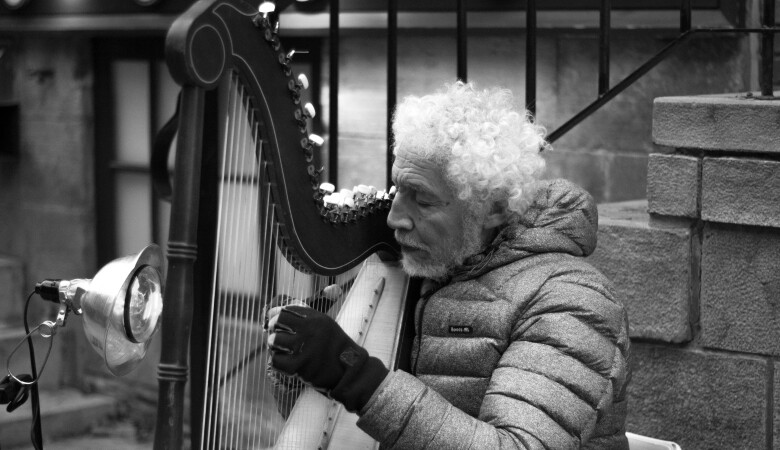Seeing the Needy and Seeing God: The Beatitudes, Part 2 (Matthew Sermon 8 of 151)
February 21, 1999 | Andy Davis
Matthew 5:7-8
Holiness, Anabaptists, Beatitudes, Forgiveness
We are going to continue in our series in Matthew's Gospel as we concentrate on the Sermon on the Mount and on the beginning section of the Sermon on the Mount which is called the Beatitudes and is a series of blessings that Jesus ascribes to godly heart character.
I. Anabaptists and Mercy
Sometimes you look up, sometimes you look down. What do I mean by that? Sometimes you look up to somebody whom you have hurt, and you're in the position of a beggar, asking for forgiveness and you are needy. Other times, you're standing looking over somebody who is in the exact same position are you were in the previous scenario. What do you do in that situation? Jesus said today, "Blessed are the merciful for they will be shown mercy." Some time ago in studying church history, I came across a group of people that I came to love called the Anabaptists. The Anabaptists are related to Baptists theologically, although perhaps not historically. They were people who believed in believer ’s baptism before anyone even thought about it, back in the 16th century, the early 1500s. They believed that you should just take the New Testament and read it simply to try to find out how to run a local church. They believed in separation of church and state when no one even thought about that. For that last reason, they were seen to be dangerous people in society, kind of rebels. They were persecuted from pillar to post, both by Protestants and Catholics alike. These peace-loving people, most of them, believed the same Gospel that we do and believed in the same Jesus. Some of them had strange ideas, it's true, but most of them were just simple believers. They were chased and they were persecuted.
I came across a story which arrested me and which I've thought about often since then. It's a story of an Anabaptist pastor who was being chased by a member of the law —an officer who was seeking to bring this man in for trial. We knew what that meant: if you were brought in for trial as an Anabaptist, you almost certainly, were going to be executed. It was winter, and this man was running across a snowy field, and the man who was chasing him was gaining on him, getting closer and closer. He came to a frozen river and he had to decide whether to risk his life trying to cross the uncertain ice or whether to turned back and face the man who was chasing him. He decided to risk the ice and he ran across. As he almost reached the other side - he actually had gotten to the other bank,- he heard a terrible crack behind him and he saw that his chaser, his persecutor, had fallen through the ice. Now he stood at a key moment. What would he do? What would you do if you were in that situation? Keep running, right? Run faster. No, he didn’t. He turned around because the man was calling for help. He knew that he would die, and the pastor knew that the man would die if he didn't go back for him. So he turned around and he risked his own life walking back on ice that has already been broken. He leaned over and was able through the providence of God to bring this man back up, out of the cold water and up to the shore. He took his cloak and put it around his persecutor. He warmed him, rubbed his shoulders and got his temperature back up to normal. The man started to feel a little bit stronger and stood up. You know what he did? He arrested that pastor and brought him into town. The man was prosecuted and was convicted of being an Anabaptist. Back then, of course, Anabaptists believed in total immersion baptism and so those that persecuted the Anabaptists thought that a good way to execute them would be by drowning. So they brought this man back to the river, to that hole in the ice, and they drowned him in that hole. This is a very fascinating story to me, because you see the turn-about that keeps happening in the story. You see somebody in a position of strength chasing somebody who's in a position of weakness. Then the whole thing changes, doesn't it? Totally reverses. Then the person who was in the position of weakness is now in the position of strength. He's the only one who can pull him up out, and he does so. Then the whole thing switches again. Jesus said that in these key moments of life, what do you do? Are you merciful or are you merciless?
II. Relationship between “the merciful” and “the pure in heart”
It's very interesting that the Sermon on the Mount begins with a statement, "Blessed are the poor in spirit, for theirs is the Kingdom of Heaven." “Blessed are the spiritual beggars, for theirs is the Kingdom of Heaven.” “Blessed are those who mourn for they will be comforted,” referring to mourning over sin. “Blessed are the meek, for they will inherit the earth,” refers to heart attitude of submission, of yielded-ness. And then He says, "Blessed are those who hunger and thirst for righteousness, for they will be filled." Those first four heart qualities, those Beatitudes, I looked at those first four and then the second four, the first of which is, "Blessed are those who are merciful for they will be shown mercy" and "Blessed are the pure in heart for they will see God," then, "Blessed are the peacemakers for they will be called sons of God," and, "Blessed are those who are persecuted because of righteousness, for theirs is the Kingdom of Heaven." The first four look different than the second four. John MacArthur says that he thinks that the first four are about inner things and the last four are about external things. The problem I have with that is that there's nothing more internal than Matthew 5:8: "Blessed are the pure in heart, for they will see God." So I don't think that's a good distinction, but I do think there's a distinction. I think what's going on with the first four is that they recount the preparatory work of the Spirit while the second four are the out-workings of that preparation. The first four get our heart ready. The second four see us moving out and starting to act differently. For example, in terms of mercy, “blessed are the merciful,” it has to do with the way we interact with people around us. We're going to see more about what the Bible means by mercy as we continue. But when we say, "Blessed are the pure in heart," inwardly, we are moving out - we are moving out to put sin to death, moving out to grow in holiness and in righteousness. We are seeing an effect. So it really is a cause and effect. We begin by heart attitudes that get us ready, and with the second four we see the effects of that heart attitude, the effects of that preparation.
III. Showing Mercy - Seeing the Needy
Let's zero in now on what it says, "Blessed are the merciful for they will be shown mercy." Jesus' world was not unlike our own in terms of mercy. Jesus' world was absolutely not characterized by mercy. Actually, Jesus' world could be considered to be unmerciful. Look at the Romans, for example. Have you ever seen a movie which showed gladiator fights in the Colosseum? We all know you get that image of the hand to hand combat between the two participants. At one point, one of them would gain the advantage over the other. He'd be lying flat, prostrate, and the other would put his foot on his chest and put the sword down at the nape of his neck. Then where would he look? He looked up at the Emperor. You know what the Emperor would do? He'd stick out his thumb. The moment of truth had arrived. If the emperor went “thumbs up”, it meant that that man was to show mercy to the fallen gladiator. He was not to kill him. If his thumb went down, he was to pursue and finish it off. He was to kill him. The crowd around the Emperor would cry for blood. They wanted one thing and one thing only. If the Emperor's thumb ever went up, they would boo and hiss, although not too loud, lest they might feel the Emperor's wrath. But they wanted blood. If the thumb went down they would cheer with the crazy ferocity of wolves who'd smelt a little bit of blood. Jesus' age was an unmerciful age, and the Romans were unmerciful people. One of their philosophers, Seneca, said that mercy is a cancer of the soul. You can see that the Romans had to take that attitude because they dominated the world. If they had been kind and merciful, they would not have been world dominators, would they? So you can see that this lines up with the way the Romans behaved. But it wasn't just the Romans. Look at the Jewish religious leaders. Would you say they were characterized by mercy? By no means. When someone was weak before them, they pointed the finger and accused him of sin. Time and time again, Jesus had conflicts with the Pharisees over this very issue of mercy. Jesus' world, not unlike our own, was an age of un-mercifulness.
We also here in America have tendencies in the same direction. People cheer at movies when somebody coldly blows someone else away for revenge sake. That's total “un-mercy,” isn't it? It's that coldness of heart. The popular people, non-Christian people, thrive on that kind of revenge motive. It's kind of exciting, isn't it? It gets the blood moving. But remember I said that the Beatitudes are really the cutting edge which separates Christians from non-Christians. If you look at this series of character traits, here at the beginning of the Sermon on the Mount, you are not going to see anything which a non-Christian person will naturally exemplify. All of these attributes, will come in only by the working of the Holy Spirit. They all fit beautifully together in the heart of a Christian, but they have no place in the heart of a non-Christian. A non-Christian does not aspire to these things, cannot understand them- they are foolishness to him. But to a Christian, we look at this list and say, "This is what I want to be. I want to be a spiritual beggar. I want to mourn over my sin. I yearn to be meek. I hunger and thirst for righteousness. I want to be merciful. Oh, how I want purity of heart.” You see, these are characteristics that a Christian wants, not a non-Christian. And so, it shouldn't surprise us that this separates us from the world, this attitude and this concept of mercy.
Mercy comes right to the heart of God, doesn't it? The heart of God is mercy. The heart of what He has done in the law and the prophets, in the old covenant, was mercy. The whole system was set up to demonstrate God's mercy. Let's try to understand how that works. Mercy functions, at least in terms of when I'm speaking of the mercy of God, it functions in a context of sin, doesn't it? It functions in a context when one person knows that there's nothing they can say. They have done wrong. Imagine yourself standing before the judgment seat of God, on Judgment Day. Imagine all of the holy angels and the Judgment book there, it's Judgment Day. Imagine clenching up your fist and stomping your foot and saying to God, "Give me only what I truly deserve. I don't want anything but what I truly deserve, God. Just give me justice. That's what I want." Is that what you want? On Judgment Day? Is that what you want? No, you want mercy. You don't want justice. God will be just. He is a just God, but you're yearning for mercy. Mercy cannot be demanded, can it? It can only be begged for. Do you see how this fits beautifully with "blessed are the poor in spirit for theirs is the Kingdom of Heaven.” You cannot demand mercy, you only beg for it. God grants it freely as a gift. It's not a wage. It's not something we deserve. It's just something He gives. Mercy functions in the context of sin and weakness. But it's important for you to understand how close to the heart of God mercy is. There was an interaction that Moses had in the Tent of Meeting with God. Moses wanted to have fellowship with God, and he wanted to see God, but that wasn't permitted. He was not allowed to see God, because no one could see His face and live. But God said, "I will come down and I will pronounce my name to you. I will speak my name into your ears." Oh, wouldn't you have loved to have been there? Wouldn't you have loved to have God come before you and pronounce His name into your ears. Oh, what a moment that must have been for Moses. It says that the Lord came down on a cloud, and stood there with Moses, and proclaimed His name, the Lord. He passed in front of Moses proclaiming, “ the Lord, the Lord. “ The compassionate and gracious God- slow to anger. abounding in love and faithfulness, maintaining love to thousands and forgiving wickedness, rebellion and sin. If you sum up all of that, you get mercy. God loves us in a way that He does not treat us as our sins deserve. Isn't that what mercy is all about? To not treat one as their sins deserve. That's what God does. He does not treat us as our sins deserve. This morning you got up, and you were under the blessing of a promise that had been made, a statement about God. In Lamentations 3, it says that, “Because of the Lord’s great love we are not consumed, for his compassions never fail. They are new every morning; Great is thy faithfulness." Every day we see that. We see the sun come up and we enjoy the fellowship of one another. We eat food, we wear clothes. We are under the mercy of God. And for Christians it is at a deeper level. We have had all of our sins forgiven through the blood of Jesus Christ. We live in the land of the mercy of God.
It wasn't until Jesus came to earth that mercy became incarnate, that mercy took on a body. Jesus was mercy incarnate. Jesus' miracles were merciful, weren't they? Look at His miracles. In Matthew 9:27 it says that, “As Jesus went on from there, two blind men followed Him calling out," [What do they call out? Look at that.] "Have mercy on us, son of David." What do the blind men, these two blind men mean when they said, "Have mercy on us, son of David"? What do they want? They wanted to receive their sight. A restoration of sight was mercy from Jesus to the blind people. In Matthew 15:22, you see the same thing. A Canaanite woman comes to Him crying out and she says the same thing, "Lord, son of David, have mercy on me. My daughter is demon-possessed and suffering terribly.” So what would mercy be from Jesus to this woman or to the daughter? That the demon would be cast out. We are getting a broader understanding of mercy here. The same thing over in Matthew 17:14 when it says, "When they came to the crowd, a man approached Jesus and knelt before Him. 'Lord, have mercy on my son’ he said, ‘He has seizures and is suffering greatly.He often falls into the fire or into the water.’” How would that man define mercy at that moment? That Jesus would heal his son.
We see two aspects of mercy. Mercy is a matter of the forgiveness of sins, and it is also a matter of the alleviation of the effect of sin. We forgive sinners, and we also try to alleviate the suffering that comes as a result of sin. It's both. Christians throughout church history have sought to do what we call acts of mercy. Christians have started more hospitals, started more orphanages, more poor homes, have done more ministry to the poor and needy of the world than any other group, any other religion, without question. No one comes close to Christians in this matter. And why? Because the heart of the Lord, the heart of Jesus Christ is mercy. It's a matter of forgiveness of sins, yes, but also the alleviation of physical suffering.
In Jesus, mercy was incarnate. In Matthew 9: 10-13, he was having dinner at Matthew's house and it says, "Many tax collectors and sinners came and ate with Him and His disciples.When the Pharisees saw this, they said to His disciples, 'Why does your teacher eat with tax collectors and sinners?' On hearing this, Jesus said, 'It's not the healthy who need a doctor, but the sick.'" Then He gave them a Bible lesson. Here Jesus comes into conflict with the Pharisees on this very issue of mercy. “You study the Bible all the time. Here's homework for you, go home and study. Go and learn what this means: ‘I desire mercy, not sacrifice. For I have not come to call the righteous, but sinners.’ “ This verse is an Old Testament quotation from one of the prophets. Jesus, when He's quoting the verse is saying that the heart of the entire sacrificial system, of all the laws you seek to follow, is the mercy of God to sinners, the commitment of God to not treat sinners as they truly deserve. “You Pharisees with your meticulous law-keeping, with your finger pointing and all that, you've missed the whole point of all the law. Go and learn what this means, ‘I desire mercy not sacrifice.’” Later in Matthew 12:7, it was uncovered that they hadn't done their homework. Now, when you go to Sunday school and you're given an assignment, when you come the next week, did you do it? Well, Jesus uncovered their lack of preparation, because in Matthew 12 they came and they accused the disciples who were just picking some grain and eating it of doing work on the Sabbath. This meticulous little law- no work on the Sabbath-this is what they focused in on this law? Jesus said, "If you had learned... If you had done what I told you to do and learned what these words mean, 'I desire mercy, not sacrifice,' you would not have condemned the innocent." To Jesus, the heart of his teaching was the mercy of God. Precepts, that was Jesus. Learn what this means, "I desire mercy, not sacrifice."
The absolute center and core of Jesus' mercy was demonstrated when He died on the cross for sin. Jesus went up on the cross, was nailed to the cross for many reasons, to fulfill many aspects of the righteousness and the perfection of God. Many aspects, not just one. One of the things that was fulfilled and demonstrated there was the mercy of God. Jesus died for our mercy so that we would not have to suffer the wrath of God, the eternal condemnation, which righteously comes to all sinners for what we truly deserve for our sin — eternal separation and suffering in hell. If you were to stomp your feet on Judgment Day and say, "Give me what I truly deserve," and God granted your wish, you would get eternal condemnation in hell. Jesus came to take that punishment on Himself so that we might have eternal life. And so Titus 3:5 says, "When the kindness and love of God our Savior appeared, He saved us, not because of righteous things we have done," but because of His what? His mercy. And so Jesus was, and is, mercy incarnate.
Mercy fits together with some other aspects... Other beautiful attributes of the heart of God in ways that are hard to understand. For example, what is the relationship between grace and mercy? We know that Paul in Second Thessalonians 1:2 says, "Grace, mercy, and peace from God our Father and the Lord Jesus Christ." There's a strong connection between grace and mercy. I look at it this way, grace is a loving response when the opposite is deserved. Grace is a loving response when we deserve condemnation. Mercy is a loving response, which is evoked by the piteous capability or the piteous situation of the person asking for it. You look at the person and you see them in a piteous state and you have compassion on them. Jesus' compassion and His love are revealed in his mercy. Look at your life. Would you say you're characterized by mercy? When someone comes to you for forgiveness, are you cold-hearted toward them and make them suffer? Do you leave them twisting in the breeze? Or do you, from the heart, readily, quickly forgive? Which one? When you drive through the disadvantaged areas of our town here and you see the effect of generations of sin and suffering, some done by those people themselves and some not, and you see the effects of sin, what do you feel in your heart? Do you feel a kind of a cold aloofness, a judgmental attitude? Or would you do what Jesus would do? If they were crying out to you, "Have mercy on us," would you stop? Would you have mercy? I know Jesus would. I want our congregation to be characterized by mercy, the ability to forgive one another when transgression occurs. But also, the ability to alleviate suffering which has come through sin. We are positioned, physically, in terms of where our church is located, to be merciful in ways that many other churches aren't. We must be a merciful congregation in the way that Jesus was. How does Jesus get us on this one?
He told us a story. Jesus said, "The Kingdom of Heaven is like a king who wanted to settle accounts with his servants. As he began the settlement, a man who owed him 10,000 talents was brought to him." In case you didn't know that the Roman Empire collected about 8,500 talents in one year in taxes. So that's like the gross national product of the Roman Empire. The gross national product of America so that would be like saying “You owe 1 trillion dollars to God, or 1.3 trillion dollars, that's what you owe.” You say, "It can't be." It is that bad. That's the holiness of God, and that's the sinfulness of our human heart, it is that bad. But anyway, the story went on. "The king ordered that the man and his wife and his family and all that he had be sold to repay the debt. The man fell on his knees before him and said, 'Be merciful to me. Please forgive me.' In compassion, the king had mercy on him and cancelled all that debt. When that man went out, he found one of his fellow servants who owed him about a third of a year's wages, about $20,000. Is that a significant debt? Yes it is. He looked at that man and said... Well, he didn't just say something. He grabbed him by the throat and began to choke him and shook him and said, “Pay me what you owe me!’” That servant fell on his knees before him-and this should sound familiar-, “Be patient with me and I will pay you back,” - the exact same thing he had said to the king. “Sometimes, you look up, sometimes you look down. At that point, he was looking down at a man who was kneeling before him, and he refused. He had the man thrown off and put in prison until he should pay the debt. The other servants heard about this and they went and told the king. The king hauled this man in and said, "I cancelled all that debt of yours because you begged me to. Shouldn't you have had mercy on your fellow servant and just as I had on you?" Probably this week you're going to have the opportunity to be merciful to somebody who needs your mercy. Jesus said, "If you are truly saved, you'll be merciful. And if you're not, you won't." It's a test of character.
IV. Blessed are the Pure in Heart - Seeing God
So also is the next Beatitude: “Blessed are the pure in heart for they will see God.” I’ve thought much about this heart characteristic, purity of heart. Remember that I said that the entire Sermon on the Mount is summed up by two words — Heart righteousness. Genuine Christianity, heart righteousness. Don't you think we need to know what the heart is and what purity of heart is in order to understand this? Because again, the Greek is emphatic, "Blessed are the pure in heart for they, and they only, will see God." We need to understand it. First of all, we have to understand the God who is the one who gives this command, the God who is purity itself. 1 John says that “God is light, and in Him,” there is no what? “No darkness at all.” God is pure light, and He expects His children to be pure light as well, holy and blameless in His sight. So He says, "Blessed are the pure in heart."
What is purity? Have you ever heard of Ivory soap? Of course you have. What does Ivory soap claim? To be 99, and 44 one-hundredths percent what? Pure. I've never been able to figure that out. I look at purity as a kind of a perfect word. You either are or you aren't. But the soap company says, "We've really worked at it and this is the best we could do. We couldn't get that last 56 one-hundredths of a percent, but we got close. So when you get Ivory soap, you get soap and nothing but soap." Isn't that what purity means? It means singleness of composition. It means nothing is in there except what should be there. Purity of composition. There's only one thing there: Ivory soap. The beatitude says that our hearts should be pure. There should be a singleness of composition to our heart. Well, what is the heart? I've come up with these five things that the heart does. The heart is that which thinks, the heart is that which feels, that which wants or desires, that which chooses or decides, and that which believes.
First of all, the heart is that which thinks. It says in Genesis 6:5 that, "The Lord looking down right before the flood saw that every inclination of the thoughts of man's heart was only evil all the time." Look at that phrase, "thoughts of men's hearts," so you think in your heart. You use your heart to think. Jesus, later in the Sermon on the Mount, says, "I tell you the truth that anyone who looks at a woman lustfully has already done," what? "Committed adultery with her in his heart." In other words, he thought about it. The heart thinks. Then Jesus says in Matthew 6:21, "Where your treasure is, there your heart will be also." It means that center of you that thinks. The thing that you really value in life, that's what you'll think about the most. What do you think about the most that shows what you really value in life? Where your treasure is, there your heart will be also. Secondly, the heart is that part of you that feels. What moves you to tears? What moves you emotionally? What moves you to elation and joy? Something, I hope, other than the success of your athletic team. What moves you to joy? What moves you to sorrow? What moves you emotionally? The heart has emotion. Paul says negatively in Romans 9:2, talking about the fact that the Israelites were not being saved because they were not responding to Christ, "I have great sorrow and unceasing anguish," [Where?] . . . in my heart." It's the part of you that feels. Thirdly, the heart is the part of you that desires or wants. It's the part of you that attaches a yearning after something, it's the part of you that covets. The Bible says in Proverbs 6:25 negatively, talking to a young man in relation to a prostitute or to an adulteress, "Do not lust in your heart after her beauty, or let her captivate you with her eyes." So it's the part of you that wants something or that desires. The heart is also the part of you that chooses or decides. Hebrews 3:7 says, "If today you hear His voice, do not harden your heart as they did in the rebellion." What does it mean to harden your heart? It means to affect your will so that you choose the opposite of what God is leading you to. It affects the choice, the part of you that chooses. Then finally, the heart is the part that believes. It says in Romans 10:9, "If you confess with your mouth ,’Jesus is Lord’ and believe," [where?] “. . .in your heart that God raised Him from the dead, you will be saved." So the heart believes.
Let's come back to purity of heart. What that means is that the part of you that thinks, the part of you that feels, the part of you that wants, the part of you that decides, the part of you that believes should be single in composition. It should be pure and free from all unrighteousness. It should be holy. And if it's not, you won't see God. Blessed are the pure in heart for they, and they alone, will see God. Now, the thing that's shocking about all this is the very idea that the human heart can be pure. Isn't that shocking? Isn't that really remarkable that the human heart could be pure? If you don't think so, listen to these verses, this is what Jesus had to say about the human heart. In Matthew 15:19 it says that, "Out of the heart come evil thoughts — murder, adultery, sexual immorality, theft, false testimony, slander. These are what defile a person, but eating with unwashed hands does not defile them.” The heart defiles you. It's like the pump of cesspool. It just flows out and defiles who you are. That's the natural human heart. Jeremiah adds his testimony of this in Jeremiah 17:9, it says, "The heart is deceitful above all things and beyond cure. Who can understand it?" Well, there's one who can understand it; God says so. He says, "I, the Lord, searched the heart. I examine the mind and I reward a man according to his conduct." God understands the heart, He searches the heart, He knows it, and He says, "Your natural heart is deceptive and wicked and tricky, and you can fool yourself about whether you're in a right relationship with God or any one of a number of things.” That's the natural human heart. What's incredible here is that the human heart can actually be pure. Is it possible that the human heart can be pure? That's the beauty of the blood of Christ.
There is going to come a day when the contents of your heart will be opened up and revealed. It's called Judgment Day. Now, listen to this description in Daniel 7:9-10, "As I looked, the thrones were set in place, and the Ancient of Days took His seat. His clothing was as white as snow; the hair of His head was white like wool. His throne was flaming with fire, and its wheels were all ablaze. A river of fire was flowing, coming out before Him. Thousands upon thousands attended Him; ten thousand times ten thousand stood before Him. The court was seated, and the books were opened." Oh, what a day! What a day! Now, what's in those books? The content of our hearts is in the books. What do the books say? Jesus said in Matthew 12:36, "I tell you the truth: You'll have to give an account on Judgment Day for every careless word you have spoken." Every careless word and every careless thought as well. The contents of the heart will be open and exposed on that day. Hebrews 4:13 says, "Nothing in all creation is hidden from God's sight. Everything is uncovered and laid bare before the eyes of Him to whom we must give an account." 1 Corinthians 4:5 says, "The Lord will bring to light what is hidden in darkness and will expose the motives of men's hearts. At that time, each will receive his praise from God." The point is that God will, on Judgment Day, expose our hearts. What can purify our hearts? What can make us clean? What can wash away our sin? Nothing but the blood of Jesus Christ. Jesus' blood was shed to purify you from all sin so that you can stand before God holy and blameless in His sight. Holy and blameless in His sight. Let me ask you a question, do some self-diagnosis. Is your heart pure? What does your mind think about when it slips into neutral? If I were to have a screen come down here, and we were to put up on the screen the thoughts of your life over the last 24 hours, what would we see? Can you imagine? That's what Judgment Day is all about, isn't it? And the aforementioned screen is just for 24 hours; imagine 75 years or 90 years of that. What's your mind's natural state? What do you naturally think about? What naturally excites you? Or what kind of affections do you have? What kinds of things do you choose? What do you want? Or what do you believe? Search your heart. Were I you, I’d invite the Holy Spirit to come alongside and search your heart, let Him show it to you.
I think that without purity of heart, we are not what we seem to be. Isn't that true? We present ourself one way, but we really are something else. What do you call somebody who consistently present him or her self one way, but inside, the or she is totally different? A hypocrite, that's right. A whitewashed tomb, beautiful on the outside, full of dead men's bones and everything unclean on the inside. What happens to hypocrites on Judgment Day? They get exposed. "Not everyone who says to me, 'Lord, Lord,' will enter the Kingdom of Heaven, but only those who do the will of My Father in Heaven." Don't be deceived. Search your heart and see if you're truly in the faith. That is what Jesus is charging us to do. Ongoing purification of the heart is absolutely essential. God says, "Total purity of heart is essential for going to Heaven." He says it in Psalm 24:3, "Who may ascend the hill of the Lord? Who may stand in His holy place? He who has clean hands and a pure heart.” If you search inward and you say, "My heart isn't clean, it's not pure," then you know that only the blood of Jesus Christ can cleanse you from sin. Do you believe in Jesus, and have you taken the application of the blood of Christ through faith? It's the only thing in the world that can cleanse impurity of heart. But then, what happens after that? You say, "Well, I came to faith in Christ — I believe." What's happens then? The Holy Spirit then comes in and you know what He begins to do? He begins to purify your heart. He begins to change you. Without that ongoing purification, you are not in Christ, because that's what the Holy Spirit does. He is holy and He begins to toss things out. "No, no, no. That's gotta go. Get rid of that. We've gotta get rid of this." He cleans you out. Like Jesus at the temple, He takes a whip and He just drives those beasts out of there. Those unclean money changers, gets them out of there. He is going to clean your heart out, and if that ongoing heart purification isn't going on in you, you're not a Christian. I'm not saying that if you occasionally sin, you're not a Christian. I'm saying, if there's no principle of the ongoing purification of sin by the Holy Spirit, you are not in Christ, because that's what the Holy Spirit does. Look at the reward. I told you there's two shocking aspects to this. "Blessed are the pure in heart." Can the human heart be pure? Yes, through the blood of Jesus Christ. By faith in Christ, all your sins can be cleansed; all of them, past, present, and future, forgiven, and you will stand before God holy and blameless on Judgment Day- free from all sin and accusation.
The second part is just as amazing: "Blessed are the pure in heart for they will see God." Can a human being really look on the face of God? No one has ever done it. Did you know that? It says in John 1, "No one has ever seen God at any time." I don't care how holy you are. I don't care if you are Daniel, if you are Job, if you are Moses. You have never looked on the face of God because no one could look on Him and live. But God has promised that if we submit to His purification through the blood of Jesus Christ, we will see Him face-to-face. Aren't you yearning for that day? And so it says, "Behold what manner of love the Father has given us that we should be called children of God”, and that is what we are. Behold, now we are children of God. And what we will be has not yet been made known. But we know that when He appears, we will be like Him for we will see Him as He is. Isn't that beautiful? In 1 John:3 it says, “All who have this hope in Him purify themselves, just as he is pure.” It says in Hebrews 12:14, "Make every effort to be holy; without holiness, no one will see the Lord." You have to have this principle of ongoing purity. If you're a Christian, you will succeed, in the end, by the purity of the blood of Christ and by the glorification, which the vision of Jesus brings about. You will be like Jesus, holy and blameless in His sight. Don't you yearn for that day? How can we become pure in heart? I'm going to keep bringing you back to Matthew 5:3, "Blessed are the spiritual beggars." Do you feel lack inside you right now? As you think about it, do you feel like you're not what you should be? Good. That means you're listening to the word. Go back to Matthew 5:3, "Blessed are those who beg God for theirs is the Kingdom of Heaven." Then Matthew 5:6, "Blessed are those who," what? "Hunger and thirst for righteousness for they will be satisfied."
V. Application
So I say recognize, first of all, that the Holy Spirit alone can do this in you, and that He will do it in you if you submit to His leadership. Allow Him to search your thoughts, your passions, your desires, the things you choose. Pray with King David, "Search me, O God, and know my heart. Try me and see my anxious ways." Allow Him to move though your heart. Be open for Him to show you sin and uncleanness. And when it comes, confess it. 1 John 1:9 says, "If we confess our sin, He is faithful and just to purify us." Isn't that beautiful? Through our confessions and through faith in Christ, we are purified from all sin and uncleanness. Confess your sin. Take time to mourn over it, though. Don't go so quickly. Mourn over the sin, allow it to hurt before you just quickly accept this forgiveness. And then be a spiritual beggar every day. Begin each day by saying, "God, here I am as a beggar. I kneel before you and I say, 'Make me more pure today than I was yesterday. Purify me, be merciful to me, the sinner, and purify me.'"
Then concentrate on your thought life. I was talking to somebody recently, who said, "How can you control your thoughts?" I said, “It is analogous to buffet kind of restaurant where you take a plate and you walk down the buffet line. You've got your seafood, "Forget it." You move on, and there are sweet potatoes, Do you like sweet potatoes? Well, if you like sweet potatoes, what are you going to do? You're going to take a heaping spoonful of sweet potatoes on your plate. What's next? Meat. You may put several pieces on your plate. You like sauerkraut? No. Alright, move on and there's the dessert section,. You put another heaping portion on your plate, right? You see how it works? Now, think about your thoughts that way. As you're moving through life, Satan's going to try to hand you some things. What do you take to heap onto your plate? What do you put there? It’s what you want to eat. You see? There's no problem with something coming through your mind just like items being on the buffet table. As soon as you recognize what it is, you kick it right out, if it's from Satan. This is nothing, just temptation, that is all. But what is it that you get a spoonful of and put on your plate? Now, that's what you're culpable for. Control your thoughts, because it says in Colossians 3:1 that, "We are to fix our minds on things above, not on earthly things." You're able to control your thoughts, and you're able to be pure in heart. Finally, I would recommend also that each one of you give careful attention to secret acts of worship that no one will ever know about— things you do in terms of giving financially, in terms of prayer, worship, certain commitments you make that you never tell anyone about ever. That shows that you're yearning after purity of heart when only God can see you.
I'm speaking to all kinds of people, but basically, two groups, those who have been born again through faith in the blood of Jesus Christ, and those who haven't. If you don't know anything about the purity of heart I'm talking about today, and if you feel that God is leading you to receive the forgiveness that He can alone give through Jesus Christ, today for you is a day in which you can call on the name of the Lord. If today you hear His voice, don't harden your heart, but yield to Him and receive Him as your Lord and Savior. There's nothing significant about that moment, but there is something significant about the leading of the Holy Spirit. If He leads you to follow Him, then follow Him.






























